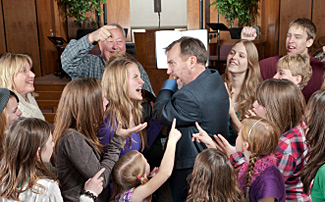As a church leader, ask yourself a few questions:
- What makes our church tick?
- What values lie behind the decisions we make, where we spend our money, and where we place our emphasis in ministry?
- Are these operational values consistent with our stated, shared values?
- What are the hidden conflicts in our congregation over our shared and personal values?
- What are the hidden, subterranean, conflicts among our leaders that are connected to their personal values as they rub up against our personal values?
- What shared values do we have that don't seem reflected in our congregation's mission, functioning, spending, and allocation of people resources?
- Am I causing conflict because I am letting my personal values become more important than our congregation's shared values?
These are terribly important questions church leaders must ask themselves. Their personal values may not be a reflection of the congregation's shared values — which invariably leads to tension and conflict.
Let's clarify a few things before we look more closely at personal values and shared values. Hopefully, we all share a basic and core set of discipleship values. Notice how the apostle Paul speaks directly to these issues:
Therefore, I urge you, brothers and sisters, in view of God's mercy, to offer your bodies as a living sacrifice, holy and pleasing to God — this is your true and proper worship. Do not conform to the pattern of this world, but be transformed by the renewing of your mind. Then you will be able to test and approve what God's will is — his good, pleasing and perfect will (Romans 12:1-2 NIV).
To put this into cornbread English: all our values as disciples of Jesus are rooted in our desire to please God and to submit to his will because of all God has so graciously done for us in Jesus.
 Later in Paul's message to these same brothers and sisters in Christ, he spells out what this ultimate value looks like in daily life:
Later in Paul's message to these same brothers and sisters in Christ, he spells out what this ultimate value looks like in daily life:
Love must be sincere. Hate what is evil; cling to what is good. Be devoted to one another in love. Honor one another above yourselves. Never be lacking in zeal, but keep your spiritual fervor, serving the Lord. Be joyful in hope, patient in affliction, faithful in prayer. Share with the Lord's people who are in need. Practice hospitality.
Bless those who persecute you; bless and do not curse. Rejoice with those who rejoice; mourn with those who mourn. Live in harmony with one another. Do not be proud, but be willing to associate with people of low position. Do not be conceited.
Do not repay anyone evil for evil. Be careful to do what is right in the eyes of everyone. If it is possible, as far as it depends on you, live at peace with everyone. Do not take revenge, my dear friends... Do not be overcome by evil, but overcome evil with good (Romans 12:9-21 NIV).
 Paul's words about discipleship values are remarkably similar to what Jesus taught in the Sermon on the Mount (Matthew 5:1-48; Matthew 6:1-34; Matthew 7:1-29) ... what Paul taught about the fruit of the Spirit (Galatians 5:13-26) ... what Peter taught on living for God (1 Peter 1:13-25; 2 Peter 1:5-11) ... and what is taught in a host of other passages on Christian living. These shared discipleship values are the behavioral norms for Jesus' followers as they live out their ultimate value of pleasing God and living according to their Father's will.
Paul's words about discipleship values are remarkably similar to what Jesus taught in the Sermon on the Mount (Matthew 5:1-48; Matthew 6:1-34; Matthew 7:1-29) ... what Paul taught about the fruit of the Spirit (Galatians 5:13-26) ... what Peter taught on living for God (1 Peter 1:13-25; 2 Peter 1:5-11) ... and what is taught in a host of other passages on Christian living. These shared discipleship values are the behavioral norms for Jesus' followers as they live out their ultimate value of pleasing God and living according to their Father's will.
Again, to put it in cornbread English: as a disciple, a follower of Jesus and a child of God, I will live out God's call for holy character and gracious compassion through clear and concrete ways that honor God and bless others.
However, each of us has been created as a unique disciple. We each have:
- Certain strengths God formed in us at conception (Psalm 139:13-16).
- Certain interests and insights we have developed as God has led us and worked in us through life (Romans 8:28; Philippians 2:13).
- Certain spiritual gifts that we have received since becoming Christians and the Holy Spirit took up residence in us (1 Corinthians 12:4-7; Ephesians 4:7-13; 1 Peter 4:10-11).
This means that we all have personal values that are rooted in God forming us to be unique parts of Jesus' Body, the Church. These personal values will not override discipleship values — we can't forego submitting to the will of God and living in holy and gracious ways simply because we have (for instance) the gift of teaching. It does mean, however, that we are going to see some things differently from a personal, individual perspective than anyone else in the congregation. We will be passionate about areas of ministry that don't excite others. We will honor different priorities in ministry than others in Christ's Body.
Again, to put this into cornbread English: God specially formed me to have something unique to bring to the greater good of my congregation, Christ's Body, and that unique formation creates unique perspectives and priorities.
As leaders, we must acknowledge that our personal values are important: after all, God formed them in us. We bring these values to the table as a gift to the congregation. But, we do this in the context of a larger whole — we are but one body part in the Body of Christ. We are not the head... Jesus is head of his Body (Ephesians 4:15; Colossians 1:18; Colossians 2:19). We cannot be the tail — or hand or eye or nose — that wags the dog!
A congregation, based on its calling and sense of mission, will have a shared set of congregational values. When these values and this sense of mission are clear, operational, and emphasized, the congregation will allocate its resources, focus its ministry, and call its people to serve on the basis of those values. They become the hub around which the life and ministry of the congregation turns. These shared values are necessary for the unity and proper functioning of the congregation. The only alternative is a set of competing visions that destroys any sense of being a Body of connected and vital parts that disempowers the congregation and blocks the church from incarnating the bodily presence of Jesus in its community.
Paul put it this way:
For by the grace given me I say to every one of you: Do not think of yourself more highly than you ought, but rather think of yourself with sober judgment, in accordance with the faith God has distributed to each of you. For just as each of us has one body with many members, and these members do not all have the same function, so in Christ we, though many, form one body, and each member belongs to all the others. We have different gifts, according to the grace given to each of us. If your gift is prophesying, then prophesy in accordance with your faith; if it is serving, then serve; if it is teaching, then teach; it is to encourage, then give encouragement; if it is giving, then give generously; if it is to lead, do it diligently; if it is to show mercy, do it cheerfully (Romans 12:3-8 NIV).
To put this into cornbread English one final time: my values, formed out of my unique experience as a disciple of Jesus, are just one part of the whole: it is not appropriate or godly for me to place greater importance on my unique role than the roles others play just as it is not right or spiritually healthy to place my values above the shared values of the congregation — I am a part of a bigger whole: a vital part of the bodily presence of Jesus!
Ignoring this last principle, of course, is the place where the real battle to live out our values can rub us raw!
As leaders, we can work our own agendas, based on our personal values that are permitted to transcend the shared values of the congregation. This erodes any sense of shared values and produces division in the congregation. Groups seek out leaders who share narrower values and have shown a willingness to sacrifice the many for the few. This creates a back channel flow of politics. Before long, there are no shared values in a congregation; any unified sense of mission is lost; coalitions are formed; and ministry becomes more about people getting their way than about functioning as the bodily presence of Jesus.
So what are we to do?
First, we must remember the key principles about values we learned from Paul (Romans 12):
- Our ultimate value is to honor God, submit to him, and live according to his will.
- We live out that ultimate value by behaving in ways consistent with God's holy character and gracious compassion in our daily lives.
- We offer our unique strengths, interests and insights, as well as our spiritual gifts to the whole Body, as a vital part of Christ's Body, and for the benefit of the body.
- We each recognize that we are just a part of a bigger whole, and that the shared values of the whole must transcend our own desires rooted in our personal values.
Third, when in times of transition — hiring a minister, choosing elders and deacons, determining budgets, handling conflict — we need to make sure we align those critical decisions with our shared values. Asking some clarifying questions can help us:
- Do the personal values of a prospective minister align with our congregation's shared values? Do a minister's personal gifts and passions enhance or threaten our shared values and sense of calling from God?
- Will a prospective elder or deacon exercise leadership based on unique gifts or the shared values of the congregation? Will this potential leader's giftedness and personal passions enhance or threaten our shared values and sense of calling from God?
- Does this projected budget really reflect our values as a congregation and our sense of mission and calling from God? How can we better align our budget with our shared values and this sense of mission and calling?
- Are our conflicts rooted in a clash of shared and personal values among key leaders or members? Do our shared values actually reflect our operational values? Do our stated values need to be modified or changed to reflect our operational values or vice versa?
 Conflicts arise in our churches and coalitions form because we feel so strongly about what God wants us to do. Strong feelings are good, but they must be channeled through the principles Paul teaches in Romans 12. At the same time, many tensions are the result of not living our shared values; having unclear shared values; not openly discussing the differences between our personal values and our shared values; and not submitting ourselves and our personal values to God and to the good of the whole Body of Christ.
Conflicts arise in our churches and coalitions form because we feel so strongly about what God wants us to do. Strong feelings are good, but they must be channeled through the principles Paul teaches in Romans 12. At the same time, many tensions are the result of not living our shared values; having unclear shared values; not openly discussing the differences between our personal values and our shared values; and not submitting ourselves and our personal values to God and to the good of the whole Body of Christ.
As leaders, we can and must do better. Our congregations need us to build a healthy sense of unity around genuine shared values. Even more, our world needs to see united congregations functioning as the bodily presence of Jesus, living with each other and our neighbors with holy character and gracious compassion.
This is the first of four articles related to determining a congregation's core values and how these values — hidden or stated, operational or aspirational, personal or shared, and used with integrity — work in the life of a congregation. The series is called "Discovering the Character of Your Church" and is found with other resources for churches, especially churches in ministerial transition, on the Interim Ministry Partners Website. The articles in this series are:










Reader Comments
Archived Facebook Comments